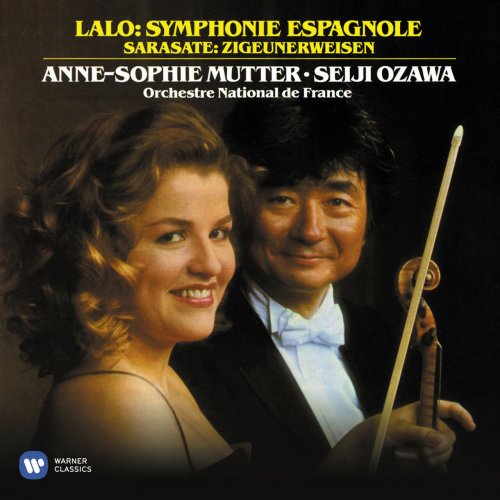
Anne-Sophie Mutter, Seiji Ozawa - Lalo: Symphonie espagnole, Op. 21, Sarasate: Zigeunerwiesen (1985)
BAND/ARTIST: Anne-Sophie Mutter, Seiji Ozawa
- Title: Lalo: Symphonie espagnole, Op. 21, Sarasate: Zigeunerwiesen
- Year Of Release: 1985
- Label: Warner Classics
- Genre: Classical
- Quality: FLAC (tracks)
- Total Time: 40:42
- Total Size: 202 mb
- WebSite: Album Preview
Tracklist:
Lalo: Symphonie Espagnole Op. 21
1. I: Allegro Non Troppo 7:42
2. II: Scherzando: Allegro Molto 4:12
3. III: Intermezzo: Allegretto Non Troppo 6:18
4. IV: Andante 6:48
5. V: Rondo: Allegro 7:45
Sarasate: Zigeunerwiesen
6. Zigeunerwiesen Op. 20 7:46
Performers:
Anne-Sophie Mutter, violin
Orchestre National de France
Seiji Ozawa,c conductor
Lalo: Symphonie Espagnole Op. 21
1. I: Allegro Non Troppo 7:42
2. II: Scherzando: Allegro Molto 4:12
3. III: Intermezzo: Allegretto Non Troppo 6:18
4. IV: Andante 6:48
5. V: Rondo: Allegro 7:45
Sarasate: Zigeunerwiesen
6. Zigeunerwiesen Op. 20 7:46
Performers:
Anne-Sophie Mutter, violin
Orchestre National de France
Seiji Ozawa,c conductor
Warhorses, strong in staying power, are rarely noted also for finesse; and much the same is true of their musical counterparts. Lalo's Symphonie espagnole, however, is something of an exception by reason of its crystalline scoring and its grace; and this particular warhorse, now more than a century old, seems to be well into its second wind. It was written for the Spanish virtuoso Sarasate, whose own showily brilliant but superficial Zigeunerweisen here makes a logical, if all too short, coupling. (As in the Perlman/DG issue, one is offered barely 40 minutes of music altogether.)
Anne-Sophie Mutter, recording for the first time with a French orchestra (appropriately enough, given the choice of works), clearly believes that there is still plenty of vitality in her steed, though in places she is apt to ride it on too loose a rein. Lalo's instruction molto rigoroso at the violinist's very first entry is openly flouted; indications of dolce or espressivo are needlessly interpreted as a slackening of pace; and the careful marking, at the start of the Andante, of mf espress, for the violin against pp strings is replaced by a delicate whisper on the edge of sound.
However, these are minute details to weigh against the pure intonation, the sweet tone and the warmly emotional and committed treatment that this much admired young artist gives the work: she is less light-weight, more characterful than Chung on Decca, without quite matching the burning intensity of Perlman (who is placed much more forward in relation to the microphone, which does help in works of this exhibitionist nature)—nor, though her technique is formidable (as she demonstrates in the Sarasate), is it quite so flawless as his. (If one may be ultra-hyper-critical, the flying scales just before letter C in the Intermezzo, and in the finale—in which the orchestra seems to be struggling to keep up with her—the high A major arpeggios before letter H and the left-hand pizzicatos before N, could all have been just that trifle cleaner.) Cleanliness, alas, is denied the orchestra, which, particularly in the first movement, is balanced too remotely and over-resonantly, thus producing a less fresh sound than either the Orchestre de Paris or, specially, the Montreal Symphony.'
Anne-Sophie Mutter, recording for the first time with a French orchestra (appropriately enough, given the choice of works), clearly believes that there is still plenty of vitality in her steed, though in places she is apt to ride it on too loose a rein. Lalo's instruction molto rigoroso at the violinist's very first entry is openly flouted; indications of dolce or espressivo are needlessly interpreted as a slackening of pace; and the careful marking, at the start of the Andante, of mf espress, for the violin against pp strings is replaced by a delicate whisper on the edge of sound.
However, these are minute details to weigh against the pure intonation, the sweet tone and the warmly emotional and committed treatment that this much admired young artist gives the work: she is less light-weight, more characterful than Chung on Decca, without quite matching the burning intensity of Perlman (who is placed much more forward in relation to the microphone, which does help in works of this exhibitionist nature)—nor, though her technique is formidable (as she demonstrates in the Sarasate), is it quite so flawless as his. (If one may be ultra-hyper-critical, the flying scales just before letter C in the Intermezzo, and in the finale—in which the orchestra seems to be struggling to keep up with her—the high A major arpeggios before letter H and the left-hand pizzicatos before N, could all have been just that trifle cleaner.) Cleanliness, alas, is denied the orchestra, which, particularly in the first movement, is balanced too remotely and over-resonantly, thus producing a less fresh sound than either the Orchestre de Paris or, specially, the Montreal Symphony.'
As a ISRA.CLOUD's PREMIUM member you will have the following benefits:
- Unlimited high speed downloads
- Download directly without waiting time
- Unlimited parallel downloads
- Support for download accelerators
- No advertising
- Resume broken downloads


